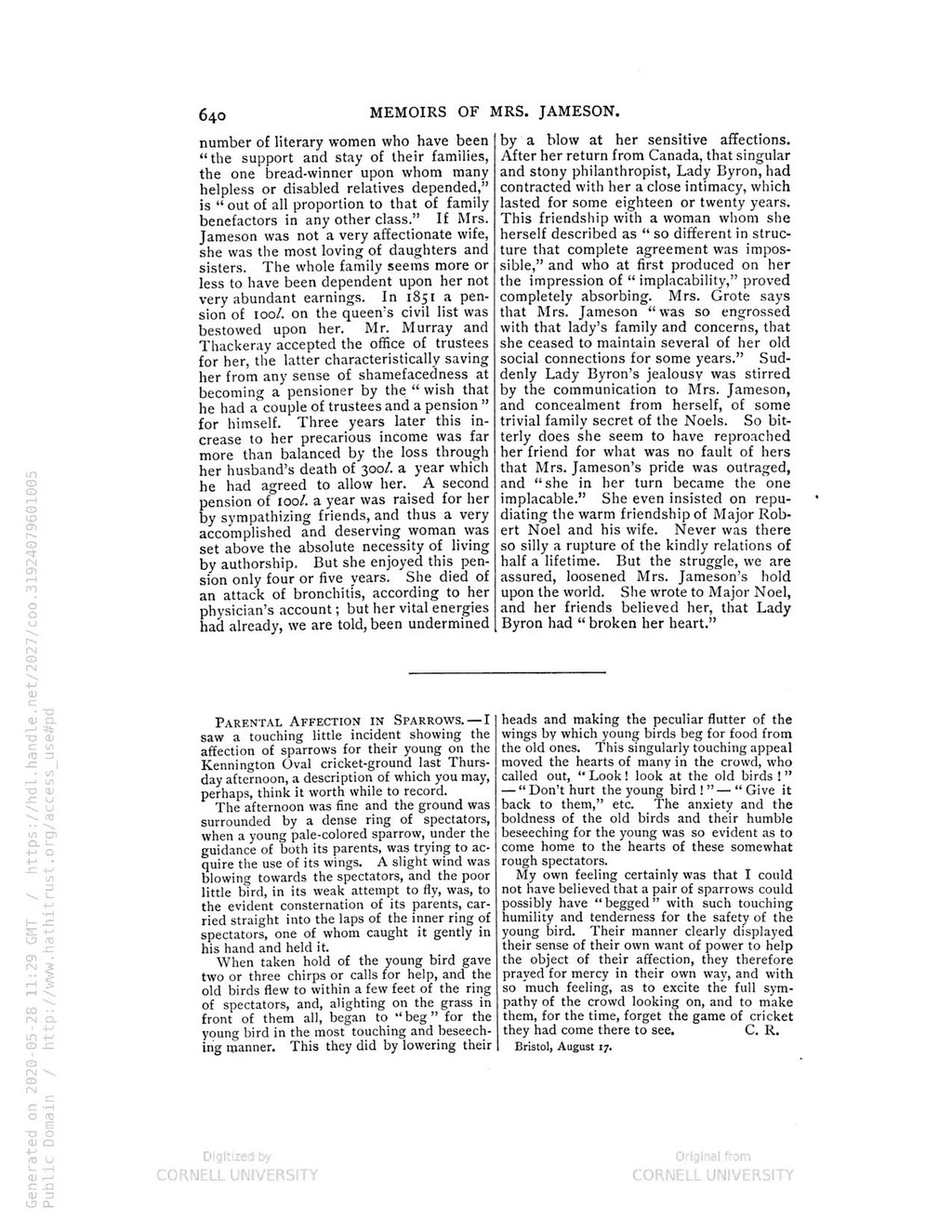number of literary women who have been "the support and stay of their families, the one bread-winner upon whom many helpless or disabled relatives depended," is "out of all proportion to that of family benefactors in any other class." If Mrs. Jameson was not a very affectionate wife, she was the most loving of daughters and sisters. The whole family seems more or less to have been dependent upon her not very abundant earnings. In 1851 a pension of 100l. on the queen's civil list was bestowed upon her. Mr. Murray and Thackeray accepted the office of trustees for her, the latter characteristically saving her from any sense of shamefacedness at becoming a pensioner by the "wish that he had a couple of trustees and a pension" for himself. Three years later this increase to her precarious income was far more than balanced by the loss through her husband's death of 300l. a year which he had agreed to allow her. A second pension of 100l. a year was raised for her by sympathizing friends, and thus a very accomplished and deserving woman was set above the absolute necessity of living by authorship. But she enjoyed this pension only four or five years. She died of an attack of bronchitis, according to her physician's account; but her vital energies had already, we are told, been undermined by a blow at her sensitive affections. After her return from Canada, that singular and stony philanthropist, Lady Byron, had contracted with her a close intimacy, which lasted for some eighteen or twenty years. This friendship with a woman whom she herself described as "so different in structure that complete agreement was impossible," and who at first produced on her the impression of "implacability," proved completely absorbing. Mrs. Grote says that Mrs. Jameson "was so engrossed with that lady's family and concerns, that she ceased to maintain several of her old social connections for some years." Suddenly Lady Byron's jealousy was stirred by the communication to Mrs. Jameson, and concealment from herself, of some trivial family secret of the Noels. So bitterly does she seem to have reproached her friend for what was no fault of hers that Mrs. Jameson's pride was outraged, and "she in her turn became the one implacable." She even insisted on repudiating the warm friendship of Major Robert Noel and his wife. Never was there so silly a rupture of the kindly relations of half a lifetime. But the struggle, we are assured, loosened Mrs. Jameson's hold upon the world. She wrote to Major Noel, and her friends believed her, that Lady Byron had "broken her heart."
Parental Affection in Sparrows. — I saw a touching little incident showing the affection of sparrows for their young on the Kennington Oval cricket-ground last Thursday afternoon, a description of which you may, perhaps, think it worth while to record.
The afternoon was fine and the ground was surrounded by a dense ring of spectators, when a young pale-colored sparrow, under the guidance of both its parents, was trying to acquire the use of its wings. A slight wind was blowing towards the spectators, and the poor little bird, in its weak attempt to fly, was, to the evident consternation of its parents, carried straight into the laps of the inner ring of spectators, one of whom caught it gently in his hand and held it.
When taken hold of the young bird gave two or three chirps or calls for help, and the old birds flew to within a few feet of the ring of spectators, and, alighting on the grass in front of them all, began to "beg" for the young bird in the most touching and beseeching manner. This they did by lowering their heads and making the peculiar flutter of the wings by which young birds beg for food from the old ones. This singularly touching appeal moved the hearts of many in the crowd, who called out, "Look! look at the old birds!" — "Don't hurt the young bird!" — "Give it back to them," etc. The anxiety and the boldness of the old birds and their humble beseeching for the young was so evident as to come home to the hearts of these somewhat rough spectators.
My own feeling certainly was that I could not have believed that a pair of sparrows could possibly have "begged" with such touching humility and tenderness for the safety of the young bird. Their manner clearly displayed their sense of their own want of power to help the object of their affection, they therefore prayed for mercy in their own way, and with so much feeling, as to excite the full sympathy of the crowd looking on, and to make them, for the time, forget the game of cricket they had come there to see. C. R.
Bristol, August 17.
